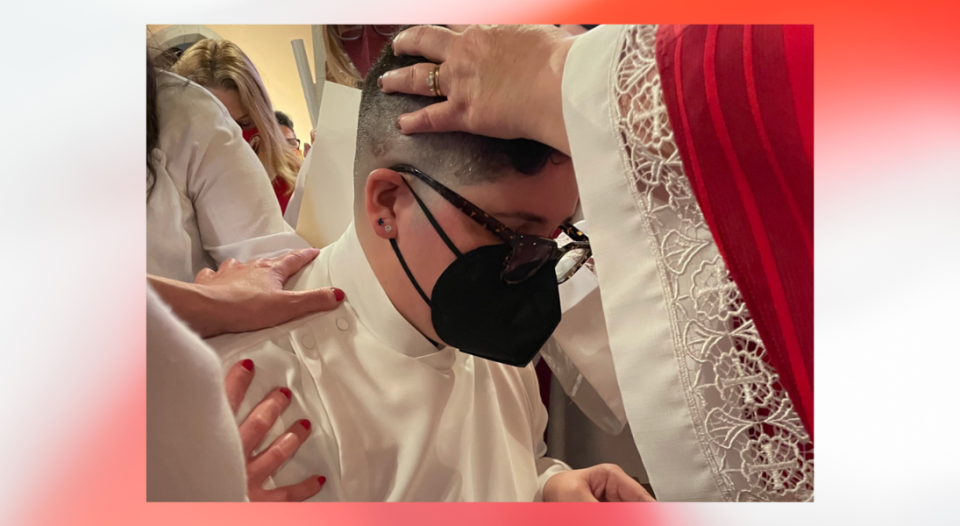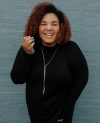As we near the end of April, we are speaking with Lutherans of Arab and Middle Eastern decent to amplify voices of our siblings in Christ and celebrate Arab and Middle Eastern heritage. Today we are speaking with Margarette Ouji (she/they), who is currently located in Montclair, N.J.
Responses have been edited for publication.
How are you connected to the ELCA?
I’m the pastor of First Lutheran Church of Montclair, N.J. In 2020, I graduated from Pacific Lutheran Theological Seminary in Berkeley, Calif. I was the first Iranian American ordained in the ELCA and celebrated my first ordination anniversary. I served on the board of directors of Extraordinary Lutheran Ministries for four years. I did not attend church, and I come from a multifaith family. (My maternal grandmother is Catholic, and my paternal grandmother is Muslim.) After graduating from a Lutheran high school and attending Concordia College in Bronxville, N.Y., I became Lutheran.
How do you believe the ELCA can better support and uplift Arab American and Middle Eastern voices and perspectives?
To better uplift and support Arab American and Middle Eastern voices, the ELCA can increase leadership opportunities for folks of Arab and Middle Eastern descent, provide funding for ministry projects, and compensate people with lived experience to collaborate with and educate seminaries and congregations on issues impacting our communities living in diaspora. We need to prioritize education in our denomination on issues that folks of Arab and Middle Eastern descent face, like racism, xenophobia, homophobia, transphobia and other forms of injustice. It is important to recognize and celebrate the God-given gifts people of Arab and Middle Eastern backgrounds bring to the church. When these gifts are recognized and celebrated, it helps to promote a sense of belonging and inclusion within the church.
What aspects of Arab American and Middle Eastern culture do you see reflected in your church community?
In my experience Iranian culture is characterized by warmth, hospitality, nurturing and welcoming attitudes. This welcoming spirit is also reflected in the diversity of Arab and Middle Eastern cultures represented throughout our denomination. I see how these values are reflected in my church community and the broader community where I live. We are working together to create a space that invites everyone to bring their full selves, recognizing that these unique and diverse aspects of ourselves are blessings to God.
In my context, specifically within the New Jersey Synod, where I serve, I see us continuing to deepen our understanding of our baptismal covenant, where we are invited to bring our whole selves, including the fullness of our identities, our joys, struggles and everything in between. As a member of the Association of Lutherans of Arab and Middle Eastern Heritage, I have observed a genuine curiosity and desire to grow in representation, inclusion and diversity among its diverse community.
In the ELCA both the LGBTQIA+ and Arab and Middle Eastern communities share a common commitment to reformation, freedom and love lived out through faith in Jesus Christ. This commitment reflects the freedom I witness being experienced through our baptism and allows us to work toward expanding the “kin-dom” of God. Each community is doing vital work to move toward freedom and constant reformation.
What do you pray for?
I pray that the ELCA continues to do the hard, often messy, and necessary work of being a church constantly reforming and widening its welcome. I pray that we continue to name as a church when we get it wrong and continue dismantling white supremacy, even when it bruises our ego. I pray that leaders begin and continue to put their pronouns in their email signatures.
I pray for my Black trans siblings, for my siblings in Iran fighting for their lives and for freedom. I pray for full access to reproductive health care. I pray for the full inclusion of LGBTQIA+ people in the ELCA. I pray for gun reform. I pray for climate justice activists. I pray for queer youth who embody multiple identities and those entrusted with their care. I pray for addicts. I pray for those living with mental illness. I pray that the Holy Spirit inspires individuals to take action and fulfill our baptismal promise of new life and active participation in the community of Christ. As the church engages with political issues, I pray that we remember our commitment to social justice and work toward creating a more equitable society.
What gives you hope?
I am encouraged by the younger people in the church and the growing presence of faith leaders who represent diverse racial, ethnic and LGBTQIA+ communities. I am filled with a sense of hope for the future when I witness the various ways we are redefining family and community. I find hope in the strength and resilience of the women of Iran, the people of Palestine, refugees and immigrants. I am filled with hope by the reformers in the church and my colleagues who preach truth, freedom and love every week despite the challenges they face. I draw hope from the fearlessness of my ancestors, who paved the way for my journey. The joy on my wife’s and daughter’s faces is a source of hope for me. During this Easter season, I find joy and hope in the persistence of life, even in the face of so much death. The hope in Christ’s resurrection is a defiant hope that sustains me.





